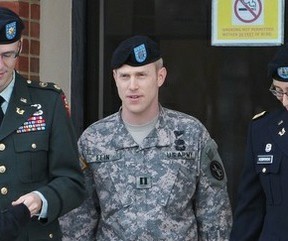 Speaking for the prosecution, Major Ashden Fein faced an unenviable task.
Speaking for the prosecution, Major Ashden Fein faced an unenviable task.
Three days of testimony had not painted a defensible picture of Bradley Manning's incarceration thus far. It had served to turn the spotlight onto the military itself; while wavering sympathies were drifting into Manning's camp.
Fein (pictured) immediately sought to undo some of the damage.
The Brig command at Quantico authorized a list of books, which Manning had requested from his auntie (he claimed that he took a 'shotgun' approach to asking for so many, on the basis that he might end up with one of them). These included texts like Howard Zinn’s A People’s History of the United States, Ford Madox Ford's The Good Soldier and David Finkel's The Good Soldiers. He received them all.
(NB I half suspect that there has been some reporting error here. Those last two could be the same book and my money is on the Finkel one. It includes a transcript of Collateral Murder, the video footage which Manning is alleged to have handed to WikiLeaks.)
Fein also received confirmation from Manning that he had requested and been given new underwear and t-shirts. This was possibly to address earlier reports that said underwear had been taken away from the private.
“They still smelled like Iraq," Manning responded, when asked why he'd asked for these items. "No matter how many times it got washed it just never went away.” Even Fein was amused by that.
However other lines of questioning did not quite go as the prosecution had planned. Fein pressed Manning to admit that, contrary to the notion that he'd been devoid of sunlight, there had been a skylight close to his Quantico cell.
"Further down the hallway, yes sir." Manning promptly replied. Not at all counteracting his previous testimony about pressing his face against the bars to see the reflection of a reflection of the sky.


 Speaking for the prosecution, Major Ashden Fein faced an unenviable task.
Speaking for the prosecution, Major Ashden Fein faced an unenviable task.
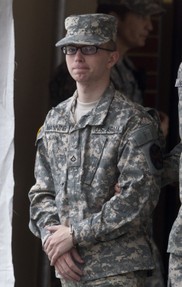 Bradley Manning was entitled to twenty minutes yard time each day. They were precious minutes spent outside the 6ft by 8ft cell that was his narrow world.
Bradley Manning was entitled to twenty minutes yard time each day. They were precious minutes spent outside the 6ft by 8ft cell that was his narrow world.



 Manning's apparent erratic behavior was also under scrutiny. The prosecution was unhappy about the incident in which Manning had placed his blanket onto his bed, so he was standing naked to attention, while guards paraded by.
Manning's apparent erratic behavior was also under scrutiny. The prosecution was unhappy about the incident in which Manning had placed his blanket onto his bed, so he was standing naked to attention, while guards paraded by.

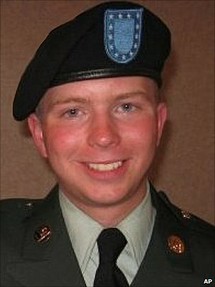 Glenn Greenwald was added to the list of people allowed to send mail to Bradley Manning. His name was added at Manning's request.
Glenn Greenwald was added to the list of people allowed to send mail to Bradley Manning. His name was added at Manning's request. 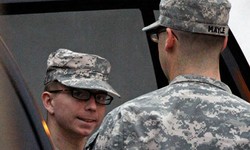

 St Tydecho's Churches in West Waleson 09/03/2014
St Tydecho's Churches in West Waleson 09/03/2014
 Goodies for an Outlander Premiere Partyon 03/06/2015
Goodies for an Outlander Premiere Partyon 03/06/2015
 Holocaust Memorial Day Interview with Rainer Höss, Grandson of Rudolf Architect of Auschwitzon 01/24/2015
Holocaust Memorial Day Interview with Rainer Höss, Grandson of Rudolf Architect of Auschwitzon 01/24/2015
 Romantic Valentine Gifts for an Outlander Fanon 01/16/2015
Romantic Valentine Gifts for an Outlander Fanon 01/16/2015

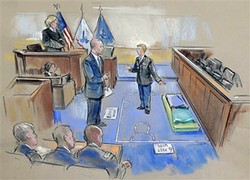
Comments
We're hypothesizing here that he may attempt to inhale the loo roll, but, as my friend pointed out, his gag reflex would kick in and so that wouldn't work either.
In short, we're struggling with this one too. But it's useful having your take on it.
My first question, which simply will not leave my thoughts, is why they wouldn't give him toilet paper? He couldn't hang himself with it- possibly attempt to slip notes to visitors but then he'd also need a pen, pencil, or some other tool with which to write. I honestly cannot see any justification for this, except to humiliate. And even if they believed that he might slip notes to visitors, that's a completely different risk factor and does not relate, even remotely, to suicidal intent.
Even if he was so suicidal, even if he was, there are many prisoners with suicidal intent who have been evaluated properly and put on suicide watch. Yes, the items granted to a suicidal prisoner or one who is at serious risk of harm need to be carefully considered, as does the periods of time in which they need to be checked- but that does not include asking for toilet paper. The worst case scenario is that he might eat the paper- but that's hardly likely to cause serious harm- or any harm really. Doesn't add up.